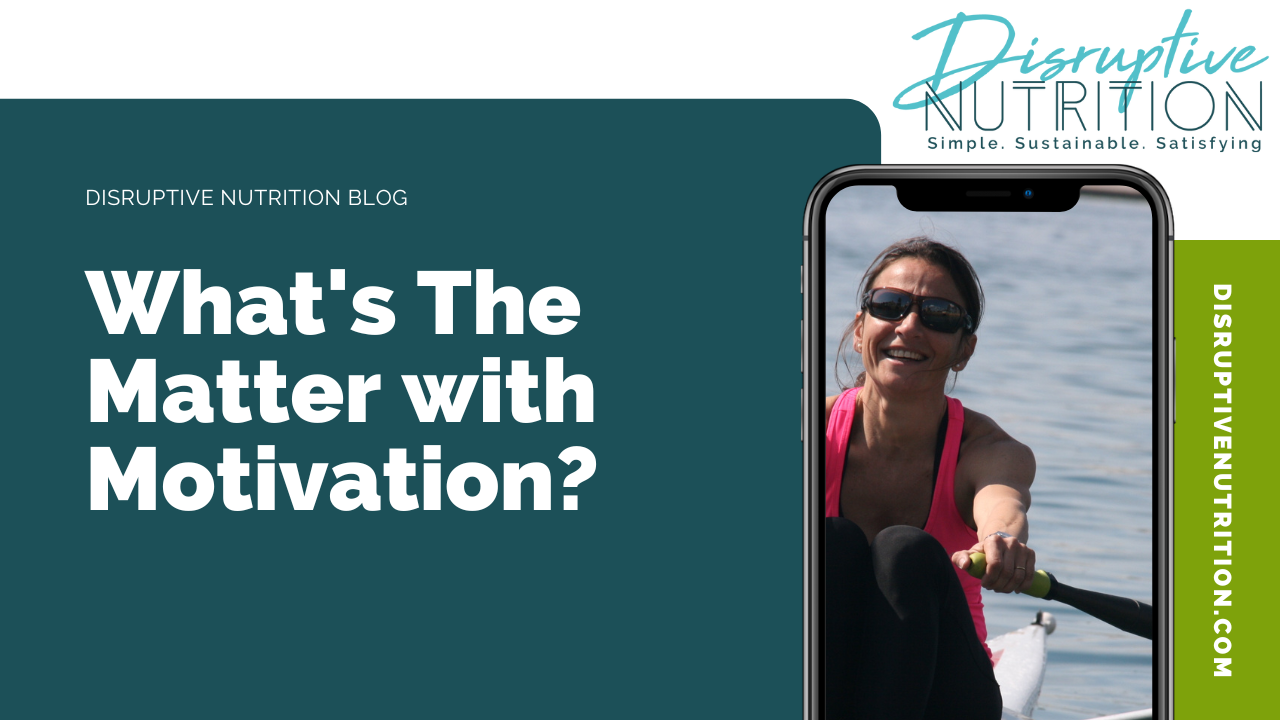What’s The Matter With Motivation?
Jun 20, 2020
How many of you get super motivated every January to get healthy, get organized, and just pull your “stuff” together, once and for all?!?!
Cue hand raising.
But then, what happens by saying, oh, I don't know…January 2nd?? if you are like me, the motivation that builds all throughout December seems to fall off that New Year cliff pretty quickly. Why? Because motivation is a fickle feeling. It comes and goes and yet too often we rely on it as a way to make sustainable change. But, if we are honest with ourselves, we aren't great at keeping the motivation high when we are tired, stressed, or just plain over it.
So what's the key? Well, at Disruptive Nutrition we teach a lot of tangible ways to not just stay motivated (because let's face it, being motivated is an awesome feeling!) but what to do when, inevitably, it will fade, even if for a little while. We NEED to have strategies in place that can help us still do things, even if we don't “feel” like it.
What's one of the KEY ways to still be successful even when the motivation is missing?
Habits. They are the small actions we make each day, and in many ways, our habits define who we are. Most of our habits are not even obvious to us because they have become an unconscious part of our identity.
Going for a run to release stress. The morning cup of coffee. The afternoon cup of coffee. Flipping on the light switch. Checking out the phone when it beeps. Biting your nails when you’re watching TV. Eating the crust off your kids' sandwiches.
In fact, did you know that 40 percent of our actions are habits?? (Yup, that’s according to a study conducted by Duke University.)
Why are habits so important? Well, our brains like efficiency. So, when it’s faced with a new situation, it tries to figure out the best way to respond to it. Charles Duhigg, author of the book The Power of Habit talks about the habit-forming system this way: when your brain is presented with a certain CUE that it has experienced before, it will trigger a CRAVING, that craving will trigger a RESPONSE, which is the action or habit, and then you will feel the REWARD. It is with these four simple steps that habits, good and bad, are formed.
Ah, I had you at “craving” didn't I? Yes, even our food cravings can sometimes be triggered by certain cues which can then become habits.
How a 1% Difference Can Make a Huge Impact
James Clear, the author of Atomic Habits, discusses ways to make tiny changes in your life that can net you “remarkable results.” He says the best way to create new habits or break old ones is to make small incremental changes, which he calls the 1-percent difference. He writes, “improving by 1 percent isn’t particularly noticeable- sometimes it isn't even noticeable – but it can be far more meaningful, especially in the long run. Making a choice that is 1 percent better or 1 percent worse seems insignificant at the moment, but over the span of moments that make up a lifetime these choices determine the difference between who you are and who you want to be.” (Clear, p. 17-18)
By changing one tiny habit today, you can net big results a year from now. Unfortunately, we live in a society where we want and expect instant results. We think that if we start eating less for three days we will lose the weight that we want to lose and keep it off. Or if we work out once or twice we will see progress toward the body we have always dreamed of.
What we need is patience. Patience, and a belief that we will eventually get to where we want to be if we are confident in our approach and we remain consistent with
The Importance of Community in Habit Building AND Motivation
I recently came across a picture a friend had taken of me at the end of a race. “Oh, right. I used to be a runner,” I thought to myself. When I started to reflect on that statement, it wasn’t that I had lost the desire to be a runner. In fact, I enjoyed running because it was a way for me to clear my head or process thoughts and emotions. But when I reflected back on why I stopped running or allowed the habit that I had developed over the course of two years to disappear, I realized it was because I had lost my community.
I used to run with a run club twice a week and then would run once on my own. It was the motivation that I received from the group that kept me going. Anytime I would say, “I’ll try to make it,” one of the run club leads would respond with a picture of Yoda saying “There is no try, there is only do.” I made sure to show up to the next group run. His encouragement was all the motivation I needed to push me forward.
It was through their energy that I was able to run multiple half-marathons. I didn’t understand how important community and habits were until I didn’t have one anymore. It took me a while to find that again. Thankfully, I have found a community that is more like family at my gym and with our community at Disruptive Nutrition. Having the support of the trainers, coaches, and other members have helped me get into the best shape of my life!
So I leave you with this…
What will YOU do when motivation stalls? (Because it will…)
Are you developing strong habits within a supportive community that will hold you accountable and supports you? Do you need one? If so, we hope you will consider being a member of ours!
Coach Deb


